Bali is one of those chill and relax type of places for me like Bangkok, so when I visited for the fourth time, it struck me that while I’ve enjoyed the villas and the beaches that Bali are so famous for, I haven’t actually checked out very much of the cultural and historical bits of Bali.
Thus, my family arranged for a half-day tour through our resort The Villas with a guide called Yogi, and headed out to check out two key cultural spots in Bali, just outside of the main Kuta area. Now getting out of Seminyak was tough – Bali’s roads have just not caught up with the sheer number of tourists, and there were some massive jams and what should probably have been a half hour drive ended up being 1.5 hours instead, with most of it stuck along a narrow main road exiting the North Kuta area.
We ended up checking out two famous temples of Bali in Tabanan, north of Kuta called Pura Taman Ayun and Tanah Lot.
Pura Taman Ayun
The Royal Temple of Mengwi
First we headed to what Yogi called Mengwi Temple, better known as Pura Taman Ayun instead – Mengwi is actually the name of the village it is located in and the king who built it, whilst Pura Taman Ayun translates into a rather poetic ‘Garden Temple in the Water’. This 18th century Hindu temple is on the list of UNESCO’s world heritage sites.
It cost just 15,000 rupiah per person to attend, but we didn’t spend that long here because the weather was pretty humid and we wanted to catch sunset at Tanah Lot. We basically took a slow walk around the compound, which was peaceful and serene even with tourists around, so good if you want to see some culture without the hordes of tourists. Take a look for yourself:

The main entrance and where most of the cars are parked

The temple is surrounded by a large moat
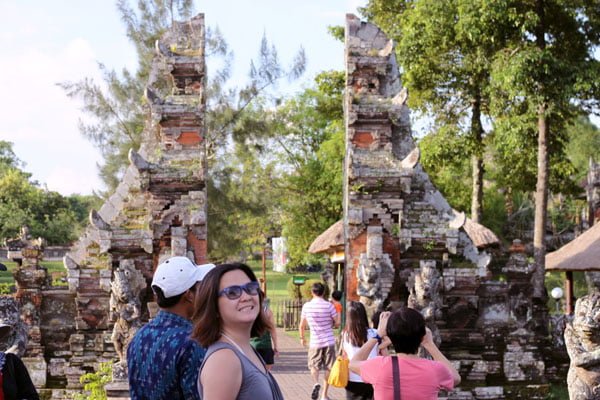
The traditional entrance to most Balinese temples and sacred places – the split gate
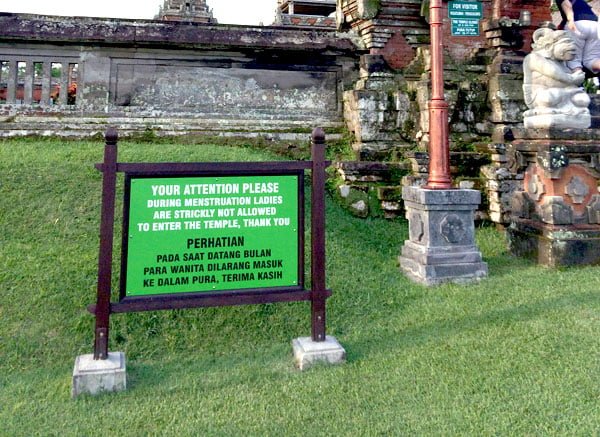
So I’m pretty sure it’s impossible to check, and I think the modern woman might pitch a fit if they were barred from visiting just because of biological cycles
Cock fighting is a big part of Balinese Hinduism, the animal sacrifice and the blood of the cock spread around the temple is supposed to an offering to the gods, and while it’s okay for religious purposes, betting on the fight is technically illegal, though that doesn’t seem to stop anyone really…

One of many caged cocks around the compound. Some are pretty aggressive and get pecky if you go too close
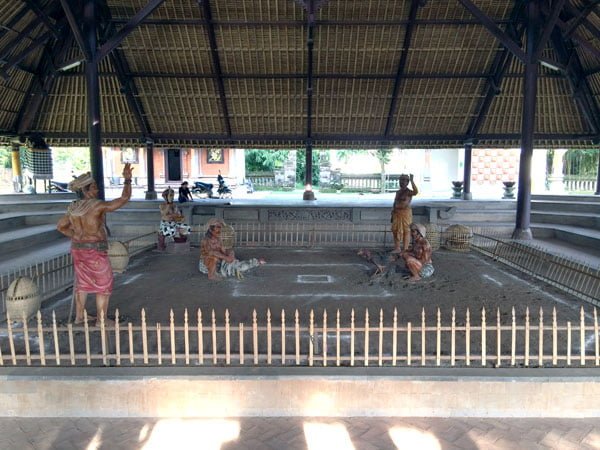
A life sized diorama of cock fighting
We visited the temple a couple of days before Nyepi, and spotted several devotees praying in the temple, but other than that it was pretty quiet all around.

Quiet moments of prayer in the inner courtyard
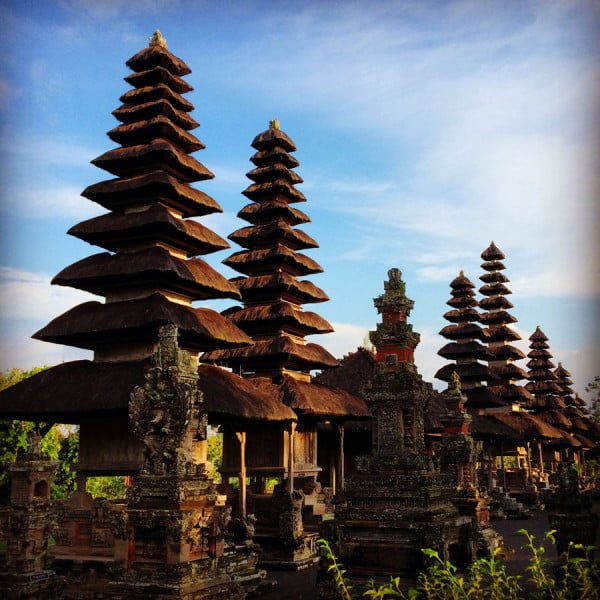
The pretty pagodas
Tanah Lot
The Land in the Sea
From Pura Taman Ayun, we drove down to Tanah Lot on the western coast of Bali. Thankfully traffic wasn’t too heavy yet so the drive wasn’t as long as the trip to Pura Taman Ayun, but it was evening by the time we got to Tanah Lot, just in time for the sunset. Entry fee was 30,000 IDR per pax.
Tanah Lot is one of Bali’s more famous sights due to its picturesque nature, a temple perched on a little rock island that can be accessed by foot during low tide.
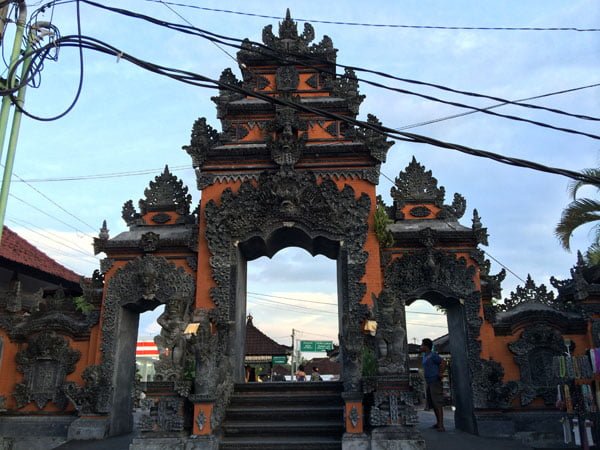
The main entrance to Tanah Lot where our driver dropped us off
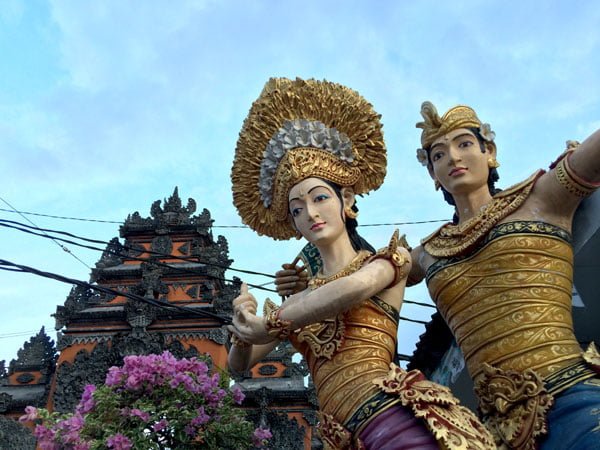
Fancy statues greeting you
You don’t see the beach straight away – it’s a walk through a small village with lots of little shops before you go down a stair onto a rather small beach. Be prepared for there to be a lot of tourists, especially at sunset. Because of that, don’t expect a pristine beach either, this one is a little grotty.
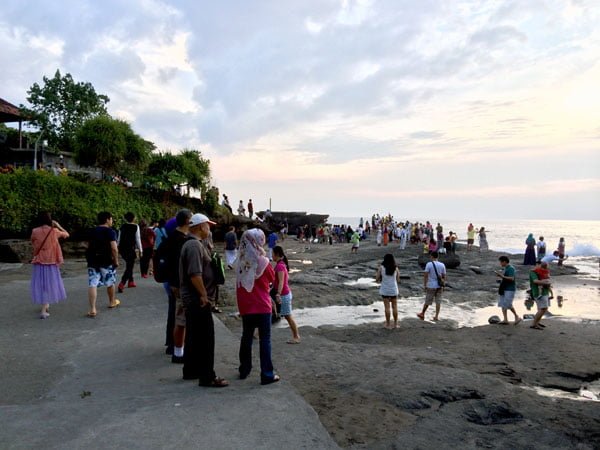
The beach is pretty small, and not really one you want to suntan on…

That’s Tanah Lot behind me, and yes you can see the crowds and the litter everywhere, boo.
The beauty of the temple is that while you can’t actually visit it (Yogi says it’s apparently infested with poisonous sea snakes that crawl around devotees who pray there, so… yeah I’m not taking that chance), you can actually walk over to the large rock in low tide. I saw a queue forming in the waters, and naturally like all Singaporeans who see a queue, decided to join it and check it out.
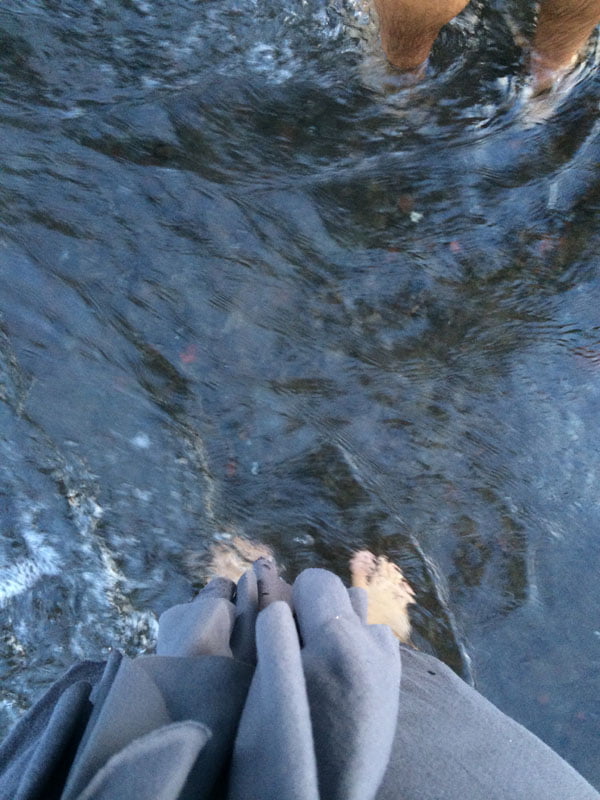
Me about shin deep in waves
The tide was low but the waves were pretty strong, they had a couple of guys stationed nearby just to make sure everyone was ok, unfortunately I was stuck behind a really annoying family with little girls that screamed every time a wave came by.
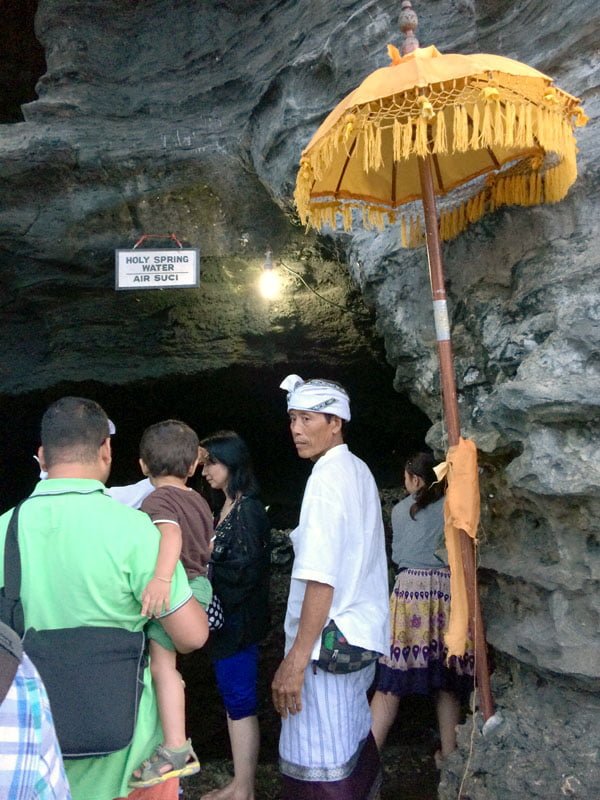
Getting blessed

Can you spot me? :) You can walk up the stairs on the left side a little ways, but there path leading to the temple above is locked
So it turns out that there is a little holy spring and altar at the base of the rock, and people were lining up to take a drink from it. The water actually comes from a little spout underneath the rock (hope it wasn’t originally a sewage pipe or something!), and as I leaned in to let the water run over my hands, I noticed the rock next to me start to MOVE – apparently I was sharing my holy water with what must be a really holy crab! Anyway, after drinking from the holy spring, you are then given a traditional Balinese blessing, where someone shakes some of the water on you and sticks rice grains on your forehead as a mark of prosperity.

The rice sticks to your head surprisingly well, even while I was sweating the rest of the evening! I had to use my nails to peel them off my forehead.
There is actually a little cavern where you can apparently see some ‘holy snakes’, though they didn’t seem to be around when we were there. It’s apparently good luck to touch them, though from what I’ve managed to glean off the internet, it seems a little bit dodgy sounding to me. I think you’re not missing much really…
Our guide Yogi found us and led us back up the stairs and we walked along the cliff, where there are several great lookout points to admire the little island of Tanah Lot from. He cautioned that the roads leading back to Kuta now would be really jammed packed with all the tourists heading back for dinner post-sunset, so heeding his advice, we stuck around Tanah Lot and had dinner at a cliffside restaurant called Warung Mandala.

Tanah Lot from the lookout point on the Cliff
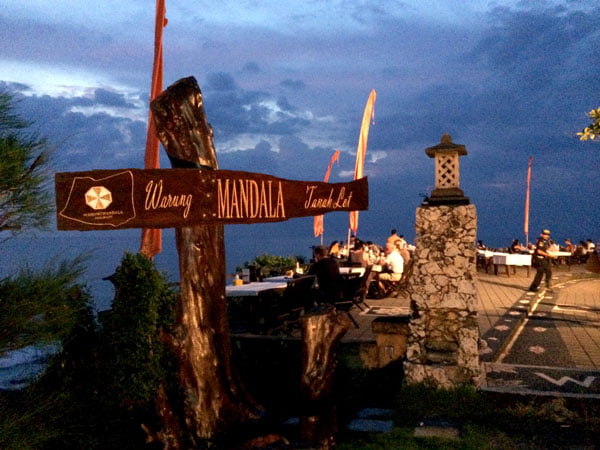
Dinner at Warung Mandala Tanah Lot
It was pretty dark by the time we sat down so that’s not much view left, but apparently this restaurant gets packed during peak season, but we found a seat without too much wait. We ordered an assortment of seafood, which was pretty decent overall, though I think the crabs and prawns were a little disappointing and small (probably needed a dose of holy water), but otherwise we had a decent dinner here, and Yogi was right – the roads were much smoother and emptier by the time we headed back, reaching Seminyak in half an hour.
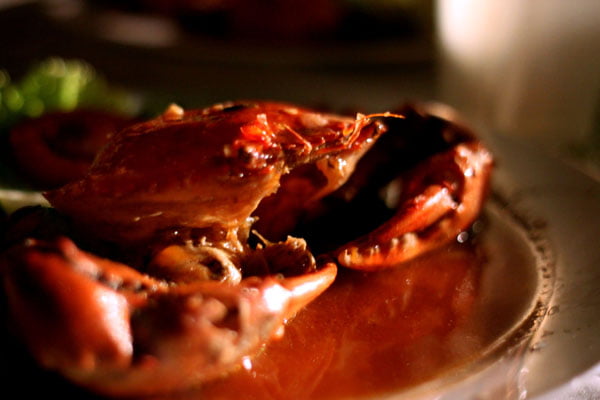
Crab for dinner!
I enjoyed finally seeing and learning about a little bit of Bali’s culture. Check out my other Bali posts on hotels to stay in and things to do.
Have you been to either of these 2 temples? Or are there other more beautiful temples in Bali that you would recommend?

imadreamer2015
Friday 27th of November 2015
Very interesting
Jaclynn Seah
Friday 27th of November 2015
hope you have the chance to check it out!
john
Monday 18th of May 2015
beautiful place
Jaclynn Seah
Saturday 23rd of May 2015
Thank you John it is beautiful indeed :)
john
Monday 18th of May 2015
indahnya bali, ingin kesana lagi